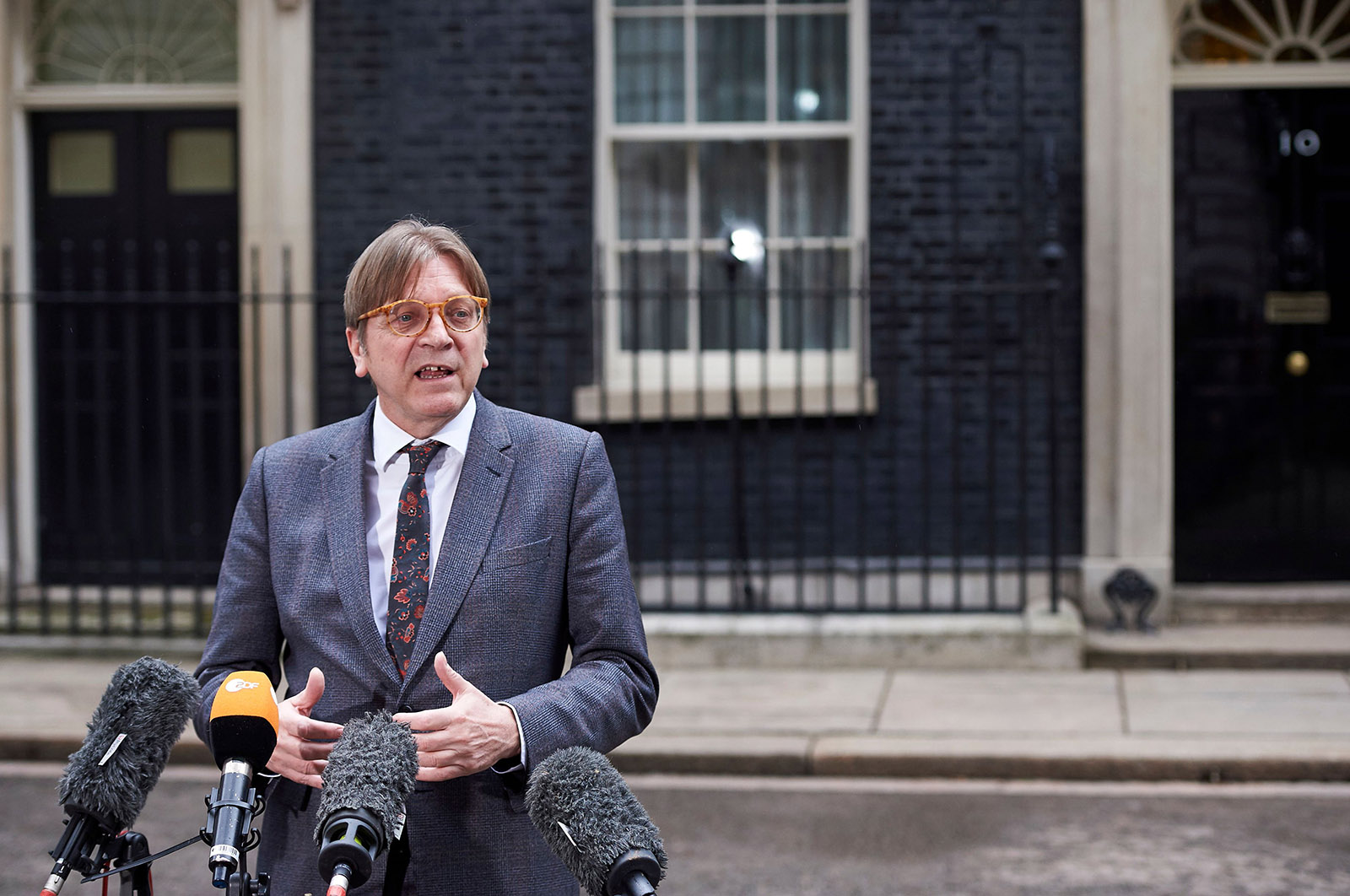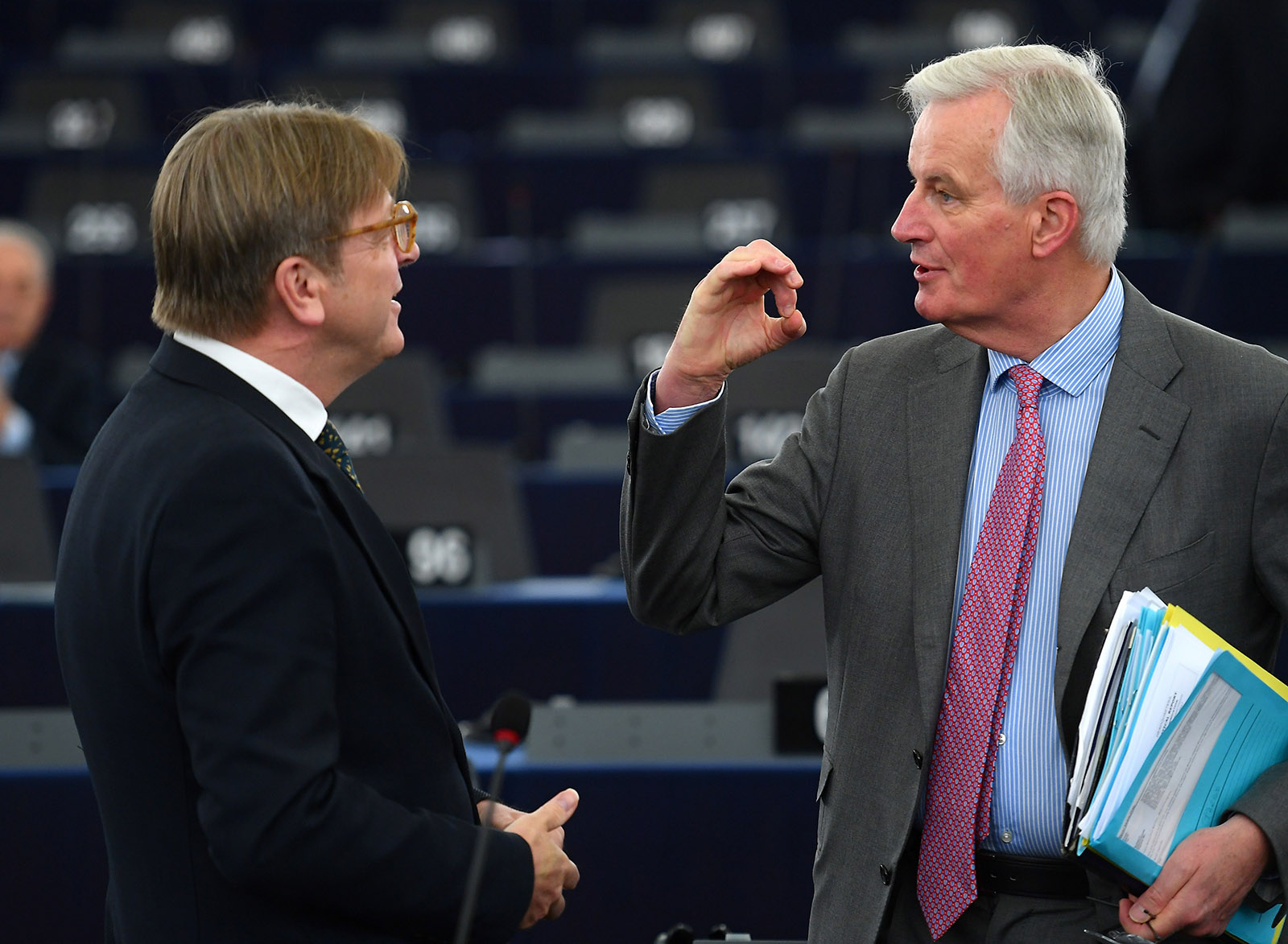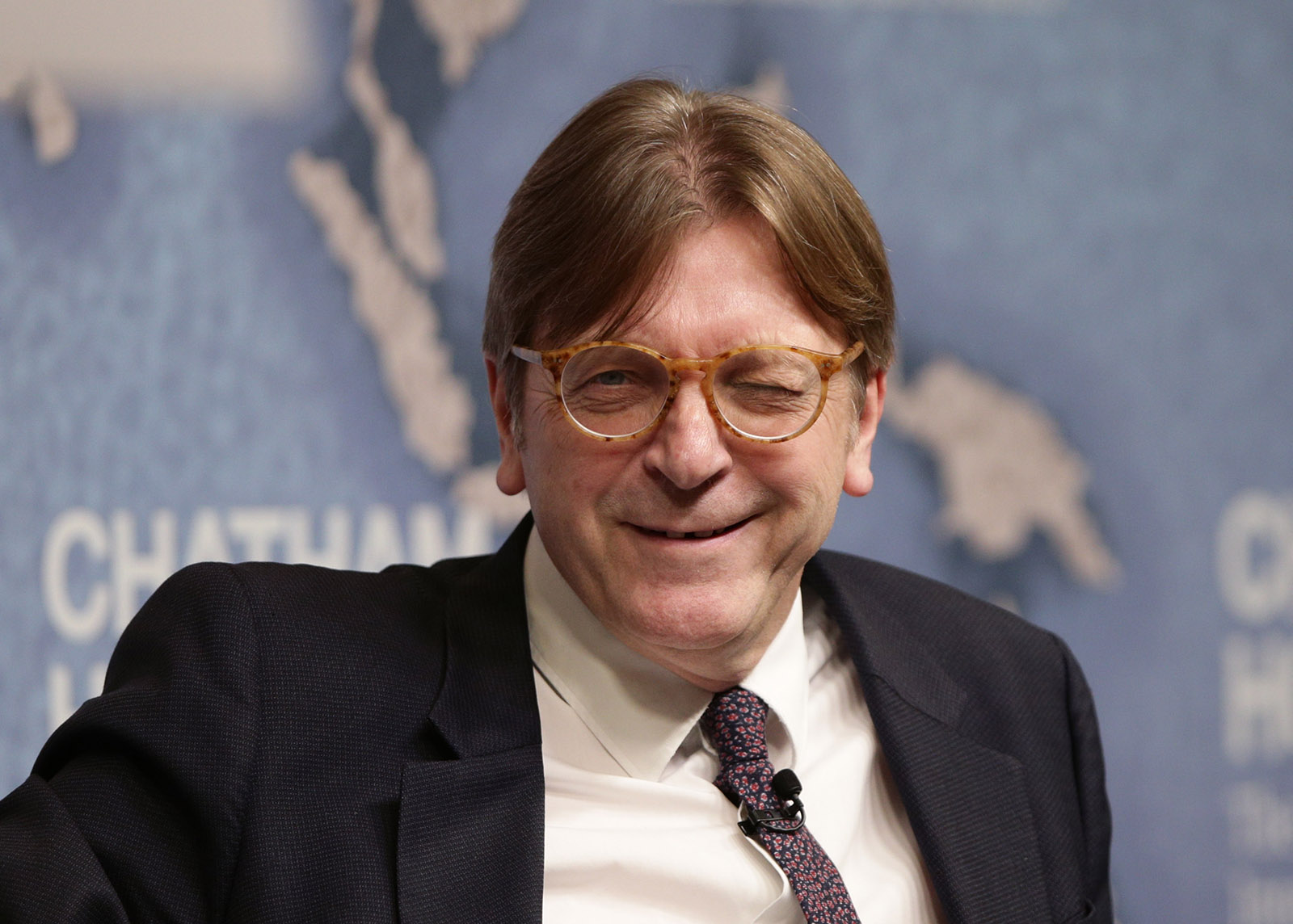Guy Verhofstadt, ex-prime minister of Belgium and former leader of the liberal group in the European Parliament, is now chairing that body’s Brexit steering group. The committee’s remit was meant to be mainly advisory, but thanks to Verhofstadt’s strong personality, it has arguably been a more visible presence on the EU side of the long-drawn-out Brexit process than the European Commission’s Article 50 Task Force, which is headed by Michel Barnier (whom I interviewed for the Daily earlier this year) and which is, in fact, responsible for running the negotiations.
As Britain’s Independent newspaper noted in 2016, “he [Verhofstadt] is the last person the Leave camp could have hoped to be appointed as lead Brexit negotiator of the European Parliament.” Nigel Farage, an anti-European MEP for south-east England and leader of the recently formed Brexit Party, went further, saying that the EU had “declared war” on Britain in appointing him. There is, of course, little love lost between the two men—in the European Parliament in Strasbourg in March, Verhofstadt compared Farage to a cowardly character from the popular British TV comedy series Blackadder.
Verhofstadt’s forceful presence and oratorical talents have, however, secured him a special place among European lawmakers. For those who pay attention to debates in the Strasbourg chamber, his speeches offer a charming interlude from the more pedestrian style of parliamentarians who typically conduct business in dreary Eurospeak.
Born in 1953 in the Flemish city of Dendermonde, Verhofstadt threw himself into politics while studying at the University of Ghent. He became the president of his party in 1982, at the tender age of twenty-nine. In 1985, he became deputy prime minister and minister of budget under the conservative Prime Minister Wilfried Martens, who called Verhofstadt “Baby Thatcher” because of his then-laissez-faire approach to economics. (Since then, many European liberals—Verhofstadt included—have become much more Keynesian in outlook.)
Verhofstadt was decidedly never a Thatcherite on matters concerning the European Union. He has always been a strong supporter of greater federalization, in fact—even though such a strongly pro-European institution-building agenda has fallen from favor in recent years. Later in this parliamentary term, Verhofstadt is expected to lead the Future of Europe Conference, which will be tasked with the preparation of a European constitution, or at least with setting out proposals for deep, structural reform of the EU. But before that, Verhofstadt has some unfinished business with Brexit to attend to…
Michał Matlak: What is most likely to happen now with Brexit?
Guy Verhofstadt: I have no idea. Nobody knows what will happen. One thing is clear, however: Brexit continues to be a very negative phenomenon—nothing good can come out of this. If you know what exactly will happen in the coming days, you will be a rich man.
There might be an extension based on the assumption that the UK will organize elections or a second referendum. There might also still be a deal—as you know, the negotiations are still ongoing. It’s good that [Prime Minister Boris] Johnson came up with new proposals because those advanced two weeks ago were not serious.
It is, however, really difficult to predict.
Do you really believe a deal can be reached by the end of October? That is very little time.
In politics, things sometimes are happening right up to the very end, even the last twenty-four hours.
But in order to get a deal done, we need the agreement of the European Council, the European Parliament, and Britain’s House of Commons. This requires time.
Well, this might require a short technical extension. If there is an agreement between the EU and the UK, such a technical extension will be granted, for sure.
There are still many scenarios possible, and it’s up to the UK to choose the one they feel most comfortable with.
One has to be clear, however: the [European] Parliament will never accept the UK’s having all the advantages of free trade and not aligning with our ecological, health, and social standards. We are not stupid! We will not kill our own companies, economy, or the Single Market. We will never accept “Singapore by the North Sea.”
Do you have a preferred option?
My preferred option is clearly No Brexit. Brexit is a bad development for the European Union, and it will be a catastrophe for the UK, especially in the case of a no-deal Brexit.
Could the EU have done more to help Britain avoid exiting the EU, as Jean-Claude Juncker admitted a couple of months ago?
The general feeling was that the referendum was an internal British affair, and we should not intervene. We were asked by all the British parties not to intervene [during the campaign], and we respected that. The main problem was a total misjudgment by [David] Cameron, not [Jean-Claude] Juncker. Cameron was sure he could dominate British politics by organizing the referendum and winning it. The problem is that this gamble has failed, with potentially disastrous results, both for the UK and the EU.
Advertisement
What we see today [in Britain] is a total division in every family, every social group. People don’t talk to each other—they feel comfortable only with those who share the same opinion as them. This is a deep division in social life!
Yes, maybe we could have been more outspoken, but all the political forces in the UK asked us explicitly not to intervene. This was probably a mistake, but we did it at their request.
It’s only recently that I’ve been invited to the UK every five minutes: to launch the election campaign for the [pro-Remain] Liberal Democrats, then to their conference in Bournemouth. Well, it’s a bit late.
What is totally new, however, is that the UK now has the largest pro-European movement in the whole of Europe. What a nice surprise!
And there’s no majority for Brexit, according to all the polls.
Yes, that’s true. But remember that it was the same before the referendum, so you have to always be cautious with the polls.
[But] there’s been a quiet change in the UK. A big pro-European feeling in the UK [has emerged]. There’s a very clear majority for staying in the Single Market—I believe that wish should be respected by the UK government. Sadly, it has not.
As an experienced politician, what would you suggest to the Remainers? How would you advise them to help Britain stay in the EU?
It’s a distinctly British system; I don’t have a feel for it. What I don’t like is that Brexit has become an existential fight between the government and the opposition. In other countries, a cross-party consultation system would automatically be created to make these kind of existential decisions. I come from a country where such things are done in a consensual way. When there is a problem, we always create a cross-party committee to find ways to solve it.
When it comes to the UK, I think the Remainers could put forward an alternative no-confidence vote to change the government, prolong negotiations, and wait until elections, which must be organized anyway. Then a second referendum could be organized—as the Brits now seem to understand much more clearly the consequences of leaving the EU.
But we don’t interfere in their choices. It’s really up to them to decide. The EU is not a prison; they are not forced to stay.
Maybe the Leave campaign was right, maybe the liberal EU is the product of yesterday?
Well, I’m more euroskeptic than the euroskeptics! There are so many things that don’t work properly in the EU. The only difference is my conclusion: I want to reinvent the union, not destroy it. The EU might become yesterday’s news—because we didn’t have the guts to reform it.
How to reform it then?
In a world dominated by civilizations, not nation-states, like China, India, and the US, Europe will mean something only if it acts together. This union has no chance to survive without reforms.
To reform itself, then, does Europe need a new constitution?
I don’t exclude treaty changes, but it’s too early to speak of a new constitutional treaty. The crucial question is [what] reforms we need. And then we must decide on the form.
What is our biggest problem? We always act too little, too late. We saw that during the financial crisis, as well as the migration crisis. It’s more than ten years since the last financial crisis—we are, in fact, facing a new one, and we still haven’t overcome the results of the last one.
Is it because the euro area was a bad idea, as many economists, such as Joseph Stiglitz, are suggesting? Some are saying that eurozone countries’ inability to run their independent monetary policies is the reason that some states have been unable to move out of the crisis.
True, eurozone countries do not run their own monetary policies; we have now a common monetary policy for the euro area. But this is a fact that cannot be changed now. We need completion of monetary union, and the banking union, to give member states instruments to fight the crisis.
The same must be done for the migration crisis. What is at the heart of the migration crisis is the Dublin Convention, which must be reformed. It’s necessary to create a system where all member states share the burden of mass migration. For now, the Southern European countries are too often left alone to deal with waves of migrants. We need a reform also here, then.
Advertisement
The same goes for foreign and security policy—there are so many crises in the world in which the EU should be active. And it’s not, because of the unanimity rule that blocks all the decisions.
So, we are always acting too little, too late. Why? Because we are a confederation, based on the unanimity rule. We need to be a union in which decisions are taken by the majority. A majority system is better—sometimes you win, sometimes you lose. But in the unanimity system, you always lose.
There are more weaknesses, however. Look at the appointment of the president of the European Commission: we need to create a direct link between the office of Commission president and the citizens. Otherwise, people will never feel a bond with Brussels.
They say that this is not a popular political program, nowadays. It’s not true. More than half of the seats that went to new parties—not the traditional duo: the Christian and Social Democrats—in the European Parliament went to pro-European forces: liberals and greens. Some 75 percent of the gains went to pro-European forces.
But it’s not a given. In the next elections, we might well lose if we don’t deliver.
To achieve your vision, we would need strong pro-European governments. Many eyes are turned toward President Macron.
He has the courage and the guts to put Europe on the table in an election campaign. Normally, politicians use Europe as a foil for their own failures. Macron did exactly the opposite.
But doesn’t he want a French Europe, a Europe that is a projection of French power?
That’s old-style French thinking about Europe, characteristic of former French presidents. “We are pro-European, as long as France leads Europe.” That’s not the thinking of Macron. There’s a whole generation of politicians who believe that if we want to solve problems, we need a reformed Europe.
Listen, it’s a Philadelphia moment. American readers will know exactly what I mean. We are a loose confederation based on unanimity, which needs to be turned into a federation, based on decisions taken by majority.
But the US before Philadelphia and the Europe of today are difficult to compare: the level of cultural homogeneity, for example, is so much lower in Europe. This continent is still a domain of nation-states. One cannot build a structure that will simply override nation-states.
Well, it’s not the eighteenth century, and we don’t need to duplicate the American system. But there are a number of principles—including the majority rule—that could be introduced in Europe. We need good institutions.
After the economic crisis broke out [in 2008], US authorities needed nine months to come up with an investment plan, quantitative easing, etc. We, after nine years, were still discussing the right measures, introducing some of them, waiting with others. Things cannot function like that.
Why can Americans decide in nine months and we cannot make a decision in nine years? The answer is obvious: we are always waiting for the last small political party in one of the member states, because of the unanimity rule in Europe.
Today, you need to react quickly, immediately. If the Chinese take measures, you need to act the day after. And our answer is almost always: “too little, too late.”
Is there popular support for such constitutional reform? Last time, it failed spectacularly in France and the Netherlands. Brexit seems to be another example of anti-European sentiments.
This is a completely wrong observation. Since Brexit, we have seen a very clear growth in the popularity of the European project, in every member state. It’s the only advantage that has come from Brexit. The problem for them [the citizens] is the distance between European promises and the answers, or the lack thereof.
Our Founding Fathers wanted a Federal Europe, in fact, more than sixty years ago.
Don’t you think that their idea was more of incremental integration, starting from the European Coal and Steel Community? And maybe that’s the reason why they succeeded?
You should study the history of European integration closer! The European Coal and Steel Community was just a test. Then they created a project for a political union in 1953, but it was voted down in the French National Assembly. That’s why they had to sign the Treaty of Rome in 1957, which was just an ordinary customs union. It was a leftover after the failed 1953 constitutional project.
Your idea would be a big-bang federalization?
Don’t scare people with federalization. We need to put our resources together. We need to defend ourselves militarily, economically, in a world dominated by China, the US, and India. We are spending in the EU three times more than the Russians on defense. Do you think we are capable of defending ourselves?
No.
It’s high time to change that. Keeping our twenty-seven defense budgets separate is the biggest waste of money. It is a reason for our collective insecurity.
Are member states ready to renounce their sovereignty?
Well, their sovereignty doesn’t exist in a globalized world. Sovereignty means that you can decide your own path. European states on their own are not able to do that.
There’s only European sovereignty, if any. Only then can we decide on the European way of life.
If there’s Brexit, and there are negotiations on the future relationship, what kind of relationship would you favor?
An association agreement—and it should be as deep as possible. Membership is the best option, but if it’s not possible, let’s cooperate in as many domains as possible.
I see the EU as a coherent group of states all participating in the same policies. No menu à la carte: “I don’t want the euro, I don’t want Schengen, but I want the Single Market.” This should no longer be allowed. And then we should have a circle of states with association agreements—Great Britain, Turkey, Ukraine.
Turkey?
After last week’s attacks, it’s more and more clear that Turkey cannot be a member of the EU. Turkey is not a candidate for membership now, but we can think of an association agreement—if Ankara stops playing a destructive role in foreign affairs, as well as strengthening the rule of law and respect for minorities within the country.





